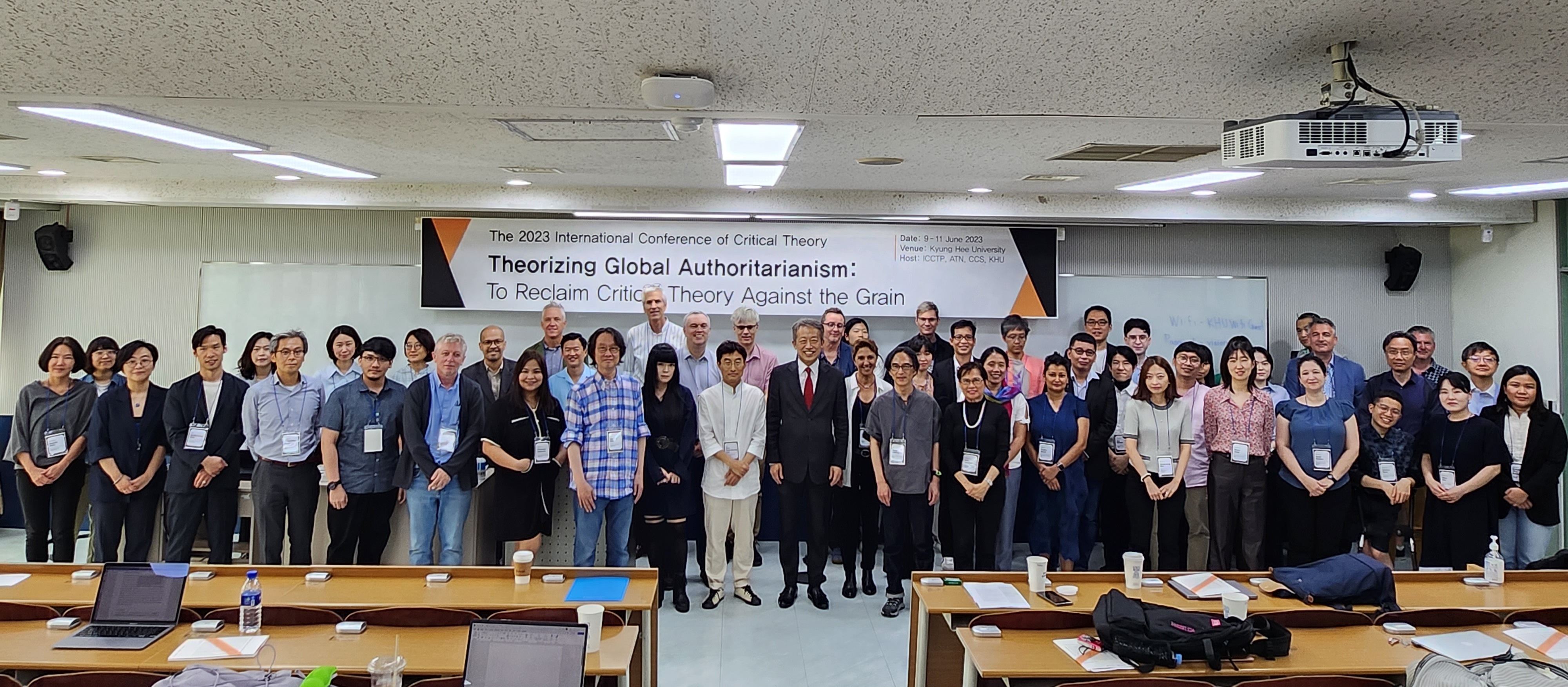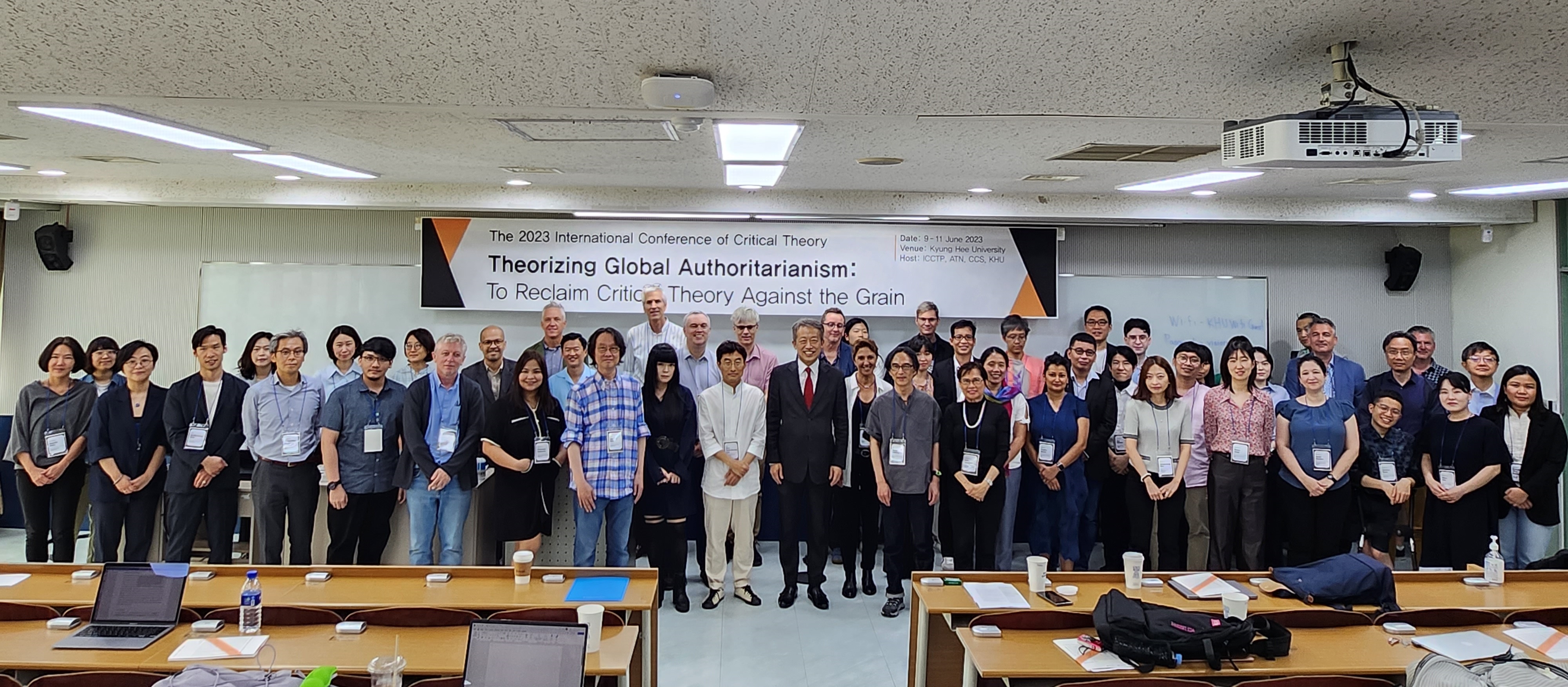News
Call for Papers An Archipelagic Turn and the “Other Asia”: Literature, Politics, Culture August 4-6, 2025 Jeju National University Keynote: Gayatri Spivak, Columbia University, US The Critical Island Studies Consortium announces a conference that aims to fundamentally challenge and reconceptualize our understanding of “Asia” by privileging an archipelagic perspective over the dominant continental narrative. In an era where global power dynamics increasingly revolve around Asia, we propose a radical reframing of how we understand this region. and its place. The persistent continental bias in interdisciplinary scholarship, particularly endemic in certain disciplines like Asian Studies, has created a fundamental misrepresentation of regional identity and relations. This conference proposes a radical epistemological shift: understanding Asia primarily through its archipelagic character rather than its continental mass. While traditional scholarship has positioned Northeast Asian continental powers as the center of “Asia,” this framework has obscured the rich, complex networks of maritime connections, island cultures, and archipelagic relations that have historically defined and continued to shape the region. Our theoretical foundation draws from multiple critical thinkers who have challenged continental-centric epistemologies. As Gayatri Chakravorty Spivak says, “we cannot turn planetarity into the production of an adjective for ourselves.” There is an ever-present risk that a global, all-encompassing representation or worldview might create its distorted reality, detached from the physical world. In constructing such overarching narratives, we may overlook the Earth itself, echoing the concerns and anxieties expressed by modernist thinkers. The imperative of our planet demands that we rethink its essence. Édouard Glissant’s assertion that “the archipelagos of the Mediterranean must encounter the archipelagos of Asia” suggests that archipelagic thinking offers an alternative perspective but an on the ontological condition of our contemporary world. This vision challenge resonates with Gilles Deleuze’s ontology of islands, which understands archipelagic spaces as existing in the productive tension between separation and connection, between continent and ocean. This ambiguous position—simultaneously yearning for separation from the mainland while maintaining complex networks of connection—offers rich theoretical ground for reconceptualizing the basic concepts and categories in interdisciplinary scholarship particularly in relation to Asia, viewed in a historical context. of Asian Studies. The name “Asia” itself reveals the problematic nature of continental-centric thinking. Originally denoting regions outside the Roman Empire before being transformed into a signifier for Greater China, it represents an arbitrary geopolitical categorization that reflects Western imperial interests rather than regional realities. The post-war Cold War system further entrenched this continental bias, dividing what was once an interconnected maritime world according to Western strategic interests. This historical context demands a fundamental rethinking of how we approach conceptualize Asian Studies. We recognize that islands are not peripheral to Asia but constitute its essential character—a reality that continental-centric narratives have systematically marginalized. This marginalization has not only distorted our understanding of the past but continues to shape contemporary geopolitical and economic frameworks in ways that privilege continental perspectives. The conference seeks to develop several critical theoretical interventions through archipelagic ontology, maritime epistemologies, and island agency. First, we aim to explore the nature of archipelagic existence beyond continental frameworks, understanding the relationship between isolation and connection, and developing new conceptual tools for archipelagic thinking. Second, we seek to center maritime networks as primary rather than secondary phenomena, developing knowledge systems that emerge from archipelagic experiences and challenging land-based assumptions in knowledge production. Third, we propose reconceptualizing islands as active agents rather than passive spaces, understanding island-mainland relations beyond dependency frameworks, and exploring island-based forms of resistance and creativity. Through these interventions, we address crucial questions: How might we understand Asia differently if we prioritize archipelagic perspectives over continental ones? What alternative histories emerge when we center maritime networks and island experiences? How does an archipelagic framework challenge current geopolitical and economic paradigms? What new methodologies are required for archipelagic thinking? These questions demand innovative methodological approaches that privilege island perspectives and incorporate indigenous knowledge systems into archipelagic methodologies. The conference aims to establish archipelagic thinking as a fundamental approach in the field to Asian Studies, that could help develop new methodological tools for island-centered research, create networks of scholars committed to archipelagic perspectives, and produce publications shaping future research agendas. We seek to foster dialogue between island-based and continental scholars, working toward a more sophisticated incisive and inclusive understanding of Asian histories, cultures, and futures. We particularly welcome papers that explicitly challenge continental-centric approaches through archipelagic frameworks, by engaging with but not limiting to any of these topics: 1. Theoretical Interventions - Critiques of continental-centric Asian Studies - Archipelagic methodologies and epistemologies - Maritime networks as alternative organizing principles - Island ontologies and their implications for regional understanding 2. Historical Reconfigurations - Pre-colonial maritime networks and their disruption - Alternative histories centered on island experiences - Maritime trade networks as primary rather than secondary phenomena - Island-based resistance to continental hegemony 3. Contemporary Implications - Rethinking geopolitics through archipelagic frameworks - Island economies as alternatives to continental capitalism - Maritime sovereignty and territorial reconceptualization - Environmental challenges from archipelagic perspectives 4. Cultural Dynamics - Island-based cultural formations and their resistance to continental narratives - Maritime cultural networks and their contemporary relevance - Indigenous knowledge systems and their challenge to continental epistemologies - Archipelagic arts and literature Submission Requirements Abstracts should explicitly address how their research challenges continental-centric approaches and contributes to archipelagic understanding of Asia. We particularly encourage submissions from scholars based in or focusing on island territories. - Abstract: 300-500 words - Must include theoretical framework - Must explicitly address continental/archipelagic dynamics - Include five keywords - Brief biographical note (150 words) Important Dates March 31, 2025 The deadline for the submission of an abstract and a short bio April 15, 2025 Authors will be notified via email ㅤㅤSelected papers will be considered for a volume on archipelagic perspectives and approaches, aiming to establish this framework as a significant intervention in the field. Organizers: Critical Island Studies Consortium, https://criticalislandstudies.com Research Institute for the Tamla Culture (Jeju National Univ.), https://tamla.jejunu.ac.kr Center for Cross-Cultural Studies (Kyung Hee Univ.), https://ccs.khu.ac.kr/?language=eng SNU American Studies Institute (Seoul National Univ.) https://amstin.snu.ac.kr/en/ Contact Alex Taek-Gwang Lee alextglee@gmail.com Lulu Reyes lu2reyes3x@gmail.com References Deleuze, Gilles. Desert Islands: and Other Texts, 1953–1974. Tran. Mike Taormina. New York: Semiotext(e), 2004. Glissant, Édouard. The Baton Rouge Interviews. Trans. Kate M. Cooper. Liverpool: Liverpool University Press, 2020. Spivak, Gayatri Chakravorty and Susanne M. Winterling. “The imperative to make the imagination flexible.” Planetary Sensing https://planetarysensing.com/the-imperative-to-make-the-imagination-flexible/
2025-01-20We would like to inform about the upcoming invited lecture titled "The Nonhuman in Literature Through the Prism of Perception-Practice-Ethics". In this seminar, we are honored to have Young-Im Kim join us to provide an overview of how Korean literature has responded to the "Nonhuman Turn" in the academic fields of the 21st century. The discussion will focus on literature that addresses nonhuman animals, critically recognizing the limits of traditional relationships, and exploring new ethical imaginings. We will also engage in a conversation about the direction of "care" within these contexts. • Presentation: Young-Im Kim (Kyung Hee University) • Discussion: Chul-Joo Lee (Kyung Hee University) • Date: August 8, 2024(Thursday), 3:00 PM • Location: Center for Cross-Cultural Studies, Kyung Hee University
2024-07-24We would like to inform about the upcoming invited lecture titled "Institutionalization of Women, History, and the Unrepresented Others". • Speaker: Hwang Ji-seong (Institute for Gender Research, Seoul National University) • Date: July 11, 2024 (Thursday), 4:00 PM • Location: Center for Cross-Cultural Studies, Kyung Hee University
2024-07-09Link to : https://2023icctpconference.wordpress.com/program/
2023-05-17https://2023icctpconference.wordpress.com
2023-01-13The 9th International Deleuze and Guattari Studies Conference in Asia Living with Deterritorializing Pathogens Towards a Planetary Community in the "New Normal" Era Date: 4 (Fri) June to ~ 6 (Sun) June , 2021 Progress: Online ZOOM for all sessions Host: Center for Cross-Cultural Studies Kyung Hee University Co-host: Kyunghee University Global Humanities Research Institute, Kyunghee University Confucius Institute Detailed timetable and link to ZOOM: Please refer to the'CCS- Conference Session Schedule' (PDF) in the attached file. Date Session / Time Moderator Speaker ZOOM LINK ZOOM PASSWORD 4 June (Fri) Opening Ceremony 09:30~10:00 Alex Taek-Gwang Lee Jungwon Park https://khu-ac.zoom.us/j/82372482213 - Ian Buchanan Kyung Lae Lee Session 1 10:00~11:20 Daniel Smith Qizhi Yu Session 2 11:20~12:40 Jungwon Park Paolo Vignola Jae-Yin Kim Session 3 13:40~15:00 Jae-Yin Kim Woosung Kang https://zoom.us/j/96125834296?pwd=ZHVobVJreVQ3Z3l3Vzc3YnVBa1oydz09 CCS2021 Tony See Session 4 15:00~16:20 Woosung Kang Nathan Widder Daniela Voß Discussion 16:20~16:50 Conclusion Discussion 5 June (Sat) Session 5 10:00~11:20 Joff P.N. Bradley Ian Buchanan https://khu-ac.zoom.us/j/88588329743 - Li Keline Session 6 11:20~12:40 Man Kwon Kim Toshiya Ueno Peter Zhang Session 7 13:40~15:00 Jason Barker Tatsuya Higaki https://zoom.us/j/96496264255?pwd=OHA0eEVLWXdpMCtiVXlnR1FTWlFBdz09 CCS2021 Meenu Gupta Session 8 15:00~16:20 Jae-Yin Kim Anne Sauvagnargues Koichiro Kokubun Discussion 16:20~16:50 Conclusion Discussion 6 June (Sun) Session 9 10:00~11:20 Jungwon Park Gregg Lambert https://khu-ac.zoom.us/j/88248542424 - Chantelle Gray Session 10 11:20~12:40 Hye Jean Chung Chun-Mei Chuang Manoj NY Session 11 13:40~15:40 Hee Jeong Sohn Paul Patton https://zoom.us/j/93567233143?pwd=M3dHMGJtcWExeGtWczROZlF2K3lPZz09 CCS2021 Joff P.N. Bradley Emine Gorgul Discussion 15:50~16:20 Alex Taek-Gwang Lee Conclusion Discussion Closing Ceremony Paul Patton Jungwon Park Any other questions or inquiries would be appreciated if you could leave them to khwe2215@khu.ac.kr. We ask for your interest and participation.
2021-04-24Date: 29 Mar 2021, 16:00-17:30 Place: Online meeting (via Zoom) Host: Center for Cross-Cultural Studies at Kyunghee University Subject: "Restarting Community": To build an alternative community in the 21st century
2021-03-31Publications
This new reading of Gilles Deleuze forges a link between his early and later works by decoding his hidden agenda for communism. Encoded in the idea of 'the Third World', Deleuze used his concept of communism as a bulwark against fascist politics and the liberal political economy. Inspired by May 68 and its aftermath, these concealed interpretations of Marx are now tacitly forgotten but can unlock a deeper understanding of Deleuze's political project. Often regarded as an apolitical philosopher, the challenges that Deleuze mounted to structuralism are easy to overlook. By reinvigorating the communist aspect of his political project and linking his ideas to Alain Badiou, Jacques Rancière and Slavoj Žižek, Alex Taek-Gwang Lee reveals Deleuze's objective: to rescue Marxism from the dogmatic status quo and revive its political agendas. This major undertaking situates his ideas alongside and sets out a new framework for reading the significance of Marxist thought in postwar France. Ultimately, this new understanding of Deleuze's critique of global capitalism opens up his vision of materialistic politics as a means of shaping the people and the proletariat of the future.
If asked to recommend only one book to read at the end of the world, I would answer Nietzsche's "Thus Spoke Zarathustra." In my twenties, whenever life felt tough and difficult, I would pick up this book and find comfort and courage within its pages. I would like to introduce it to you as the one book to take to the end of the world. "Among my works, 'Zarathustra' stands alone. With this book, I have given humanity the greatest gift ever bestowed. This book, with a voice that will resonate for thousands of years, is the greatest of all books that exist, filled with the loftiest spirit, with all human affairs lying far beneath it. Moreover, this book is the deepest of books, born from the richest depths of truth, and it is an inexhaustible well from which gold and extraordinary treasures flow forth, no matter how many times you draw from it." -Nietzsche, "Ecce Homo" Preface
It’s been almost 10 years since the #MeToo movement and the Feminism Reboot stirred up strong waves. However, has the world really progressed as much? The counterattack of men, named "backlash" by American feminist and journalist Susan Faludi in 1991, is now playing a more prominent role than ever in the political, social, and cultural landscape of Korea as of 2024. "Stiffed: The Betrayal of the American Man" is Susan Faludi's representative work, first published in 1999, with a 20th-anniversary edition released in 2019. Chronologically positioned between "Backlash" and "The Darkroom," both of which have already made significant impacts in Korea, "Stiffed" is an important work that serves as the cornerstone in that it shares with two other books the awareness that erodes the myths of ‘femininity’ and ‘masculinity’. With the translation by cultural critic Son Hee-jeong, who previously wrote commentary for the Korean version of "Backlash" and translated "The Darkroom," Korean readers now have access to three key works by Faludi. In this book, Faludi travels across the United States, listening to the stories of men under the question of "Why do men betrayed by the myth of masculinity in the world inherited from their fathers only express anger towards women without resisting society?" Based on extensive research and interviews spanning over six years, this extensive reportage navigates through history, social science, psychology, and beyond, offering deep insights and understanding of human nature. This vast exploration flows seamlessly, never dulling for a moment, and will inevitably resonate with our current questions and concerns.
Cultural critic Son Hee-jeong, who has been closely communicating with the public through various platforms such as radio, broadcasting, YouTube, and newspapers, presents a record of her thoughts over the past three years amid the outbreak and spread of the COVID-19 virus. She persistently read and watched to understand the cause of human behavior that never slows down even when faced with the planetary crisis, and presents here a list of thoughts connected to the feminist epistemology that has always accompanied small things erased by the master narrative. "How can we speak beyond human beings without falling into destructive misanthropy?" Instead of screaming "We're all doomed" in hatred and cynicism, the author suggests finding alternatives that become possible only in the entanglement of various thoughts. The keys are the counter-puissance words, such as Chthulucene, New Materialism, feminism, oddkin, posthuman, care/dependence, refugia, that overthrow the dominant ideologies of modernity, such as humanism, developmentalism, paternalism, heterocentrism, militarism, capitalism, racism. From Guillermo del Toro's "Pinocchio" and oddkin, to posthuman's tangible form shown in "Southern Reach: Annihilation," stories about the disappearing habitats of various species on Earth, tales about refugia in "Sweet Tooth," and documentaries like "Sura" that shows us the real meaning of Chthulucene. A diverse list of viewing and reading materials not categorized under feminism and precise and clear political analyses and critiques of these works will guide the readers to a deeper and richer understanding of alternative discourses that trigger epistemological shifts.
How Poverty, Digital Technology, and Meritocracy are Contributing to an Age of Loneliness How Loneliness Destroys Individuals and Society How Lonely is South Korea? How Will Humanity Combat Loneliness? In January 2018, the world's first Minister of Loneliness was appointed in the UK. It's not surprising. According to a report titled 'Combating Loneliness' released in the UK, numerous individuals suffer from loneliness 'frequently or always', with an overwhelming number of elderly respondents stating that TV is their most valued companion. The report estimates that the economic cost of isolation and community disintegration to the UK economy would amount to approximately 52 trillion won. This underscores that loneliness is not merely an individual emotional issue. Loneliness is not a problem unique to the UK. In Japan, elderly individuals voluntarily commit crimes to be incarcerated, to solve both their loneliness and livelihood problems. South Korea is also one of the loneliest countries. Twenty-six percent of the population complains of persistent loneliness, with the figure soaring to 40% among those in their 20s. Currently, more people inhabit the world than ever before. And most reside in cities where they can easily discover the presence of others simply by opening their doors. Moreover, with the remarkable advancement of technology, we live in a 'hyper-connected society' where everyone is linked. Yet, many people still suffer from loneliness. Following the UK's example, Japan also appointed a 'Minister of Loneliness'. Why is that? Political economist Noreena Hertz named the 21st century 'the lonely century'. We cannot individually understand the circumstances of those who are lonely or becoming lonely. However, it is possible to philosophically and socially/politically approach the reasons and processes why people become lonely. If people feel lonelier than ever before, there must be conditions unique to the 21st century that have brought us to this point. Discovering what those are is the task of philosophy, the author believes. The first chapter begins by examining loneliness in historical and philosophical contexts. Until the 16th century, the English language had no word for loneliness, and this emotion emerged as something new with subsequent changes in society. Ultimately, the author points out that the causes making people lonelier in this age are poverty, digital technology, biases inherent in data, and meritocracy. Additionally, he explains how dangerous a world shrouded in loneliness can be with concrete examples and statistics. Finally, he suggests imagining together how to confront loneliness, even if somewhat clumsily. The author, as a father who brought a young life into this world at a late age, wrote this book with a fervent hope that his child would not have to live in a lonely world. He hopes that many will join him on this journey.
The Era of Intense Debate Surrounding AI Development Prospects Philosopher Kim Jae-in's Sharp Insights that Transform AI Big Bang into a Renaissance of Humanities In March 2023, the emergence of ChatGPT-4 sparked intense debates surrounding the prospects of AI development. Fears abound across technical fields, academia, and everyday life about the possibility of human-created technology overwhelming humanity. Jeffrey Hinton, the godfather of AI and pioneer of deep learning, left Google this May to freely discuss the dangers of AI, while Sam Altman, CEO of OpenAI, warned during the first-ever AI hearing in the US Congress that uncontrolled AI could have detrimental effects on the world. Will humanity be dominated by machines? Does humanity have a future? Philosopher Kim Jae-in, who has long analyzed changes in science and technology, innovatively shifts the discourse of the debate from the dominant narrative of 'Can machines surpass humans?' to an alternative narrative of 'How can humans coexist with machines?' His humanistic insights, which place humans, rather than machines, as subjects of thought, shed light on the essence of the crisis overlooked in the debates surrounding AI development. By deriving limitations through the principles of generative artificial intelligence and reflecting on human uniqueness at these boundaries, this book serves as an indispensable guide to AI. Through the perspective of philosopher Kim Jae-in, who paradoxically views the era of AI Big Bang as a Renaissance of Humanities, readers can sense the utility of philosophy in responding to crises and the resurgence of the power of humanities.
"However, humans are prey." Feminist ecophilosopher Val Plumwood confronts the most secretive truth of humans and nature through her near-death experience of almost being eaten by a crocodile. We all die someday. Whether it's old age, an unexpected accident, or departing from loved ones due to illness, death is the most certain truth, albeit with differences in its process and timing. However, what if we were to end our lives as prey to another being? Even the mere thought of it invokes fear and a shiver of anger. Val Plumwood, the author of "The Crocodile's Eye," forcefully asserts that humans are indeed prey. In 1985, while canoeing in Australia's Kakadu National Park, she encountered a crocodile three times in what she describes as the "whirlpool of death." Facing the eyes with vivid golden edge of the predator, Plumwood felt a rupture in the seemingly secure world she had inhabited until then. The anthropocentric worldview of the West, where humans reign supreme as top predators and can exploit other non-human beings at will, but not vice versa, crumbles as the painful truth emerges: humans, like all other forms of life, are also part of the food chain. Plumwood shares this shocking experience candidly, attributing the arrogance of humans, who often perceive themselves as masters, as a cause of the ecological crises we face today. She argues that overcoming this crisis requires simultaneous efforts both from an ecological perspective to reposition humans, and from an ethical perspective to reposition non-human beings. Beyond the binaries of human and non-human, civilization and nature, mind and body, Plumwood suggests that all living beings are minds as much as they are bodies and deserve respect, yet must also accept the fact that they, too, will become prey when their turn comes. In her gentle yet consistent voice, Plumwood recounts not only her overwhelming experience of almost being eaten by a crocodile but also memories of her companion wombat Bilby, with whom she shared a part of her life for over a decade, and reflections on visiting her son's grave, reconsidering Western burial practices. She seamlessly integrates these experiences to show that this perspective is not detached from our lives but rather fundamentally permeates them. "The Eye of the Crocodile" is a book that encourages us to courageously approach this important yet often overlooked truth. For those contemplating the act of sustaining their lives by taking the lives of others, this book will serve as a reliable guide and companion.
The Korean Academic Society for Public Relations, which has been publishing insights into the academic development and practical applications of PR across various topics, released a book this year that deeply reflects, from an interdisciplinary perspective, on the direction PR studies should take amid the changes of the COVID-19 new normal. As the era of COVID-19 new normal, marked by prolonged social distancing measures, including untact, non-face-to-face, and stay-at-home cultures, has become part of our daily lives, modern individuals are now referred to as 'Corona sapiens' or 'Homo coronacus', and the changes in public, relationships, and communication methods can be deemed revolutionary. This book examines new phenomena and trends arising in various disciplines against the backdrop of the COVID-19 new normal from the perspectives of public, relationships, and communication, and deeply discusses the directions in which PR studies can expand and the new roles and expectations of PR. This book, which is the Korean Academic Society for Public Relations' first collaborative publication, involving researchers in PR and communication subfields as well as scholars from other fields such as philosophy, philosophy of science, geography, tourism, and management, will provide not only new perspectives on PR studies but also ideas for fostering creative roles.
Transition from the Metaverse of Capital to the Pluriverse of Ecology Arturo Escobar, a critical researcher of development paradigms, proposes a Pluriverse of multiple universes and worlds instead of a universe centered on humanity. The book by Arturo Escobar, a leading figure in the critical research on global development discourse, has been translated and published. He is a world-renowned Colombian anthropologist, a pioneering figure in the degrowth movement who has continuously raised questions about Western growth/development discourse. Over the past decade, there have been narratives and discourses on cultural and ecological transitions produced in both the Northern and Southern Hemispheres. Concepts and movements such as degrowth, commons, symbiosis, and various transition initiatives have emerged in the Northern Hemisphere. In the Southern Hemisphere, movements for Buen Vivir, the rights of nature, the logic of commonality, and struggles towards civilizational transitions have taken place. Escobar reflects on how these movements have been carried out in Latin American countries and how they are rearticulated as a pluriverse of commonality and autonomy. The term "pluriverse", meaning multiple universes and worlds, originated from the worldview and autonomy movements of the Zapatistas in Mexico. For Escobar, the pluriverse signifies affirming the existence of 'other' worlds rather than ‘just one world’ and simultaneously indicates an ontological turn and directionality of praxis This reasoning is encapsulated in the phrase, "other worlds are possible, other possibilities are possible."
Cultural Critic Son Hee-jeong Meets 13 Women Directors The World of Brilliant Female Narratives In 2018, despite initially lackluster box office performance, "Miss Baek" (directed by Lee Ji-won) began to garner significant attention from audiences due to the strong female narrative within the film. Female audiences, who dubbed themselves "쓰백러(Baek Lovers)," started spreading promotional materials for the movie on social media, leading to multiple viewings. This trend continued in 2019 with "Kim Ji-young, Born 1982," which attracted 3.68 million viewers, and in 2020 with "Samjin Company English Class," which showed a strong momentum. Even "Lucky Chan-sil," an independent film, drew in 30,000 viewers. Why are audiences so enthusiastic about these female-centric films, often engaging in a ticketing practice known as "sending souls"? What is the essence of this new wave created by female directors? "I Saw the Universe You Painted" will provide an answer to this question. This book compiles interviews conducted by cultural critic Son Hee-jeong with 13 female directors who released feature films from 2019 to 2020: Kim Do-young, Yoon Ga-eun, Kim Bo-ra, Jang Yu-jung, Lim Seon-ae, An Ju-young, Yoo Eun-jeong, Park Ji-wan, Kim Cho-hee, Han Ga-ram, Cha Sung-duk, Yoon Dan-bi, and Lee Kyung-mi, unfolding a female film universe. As someone with a history of actively engaging in gender-based cultural criticism, Son Hee-jeong's interviews explore the films' portrayal of "women's love and hatred, desire, melancholy, and optimism," prompting reflection on how these works have become part of everyone's "story." Particularly in segments where Son Hee-jeong asks about the components of film such as camerawork, sound, and space from the perspective of a film scholar, readers can glimpse how the unconventional scenes are the results of the meticulous attention to detail in directing. Now, stop imagining only the men’s stories and let’s explore the time the directors have gone through to present women's stories as public narratives. “As women filmmakers met and connected with each other, the breadth of "female film" expanded. Each work is unique, yet as these distinctivenesses connect and encounter unhesitant words, an unfathomable universe, a deep and vast female film universe, is formed. With so many films deserving recognition as “a really good film” rather than “a well-made film, but…”, I also felt compelled to contribute. That's why I decided to write about the rich world of female films.” (from page 8)









